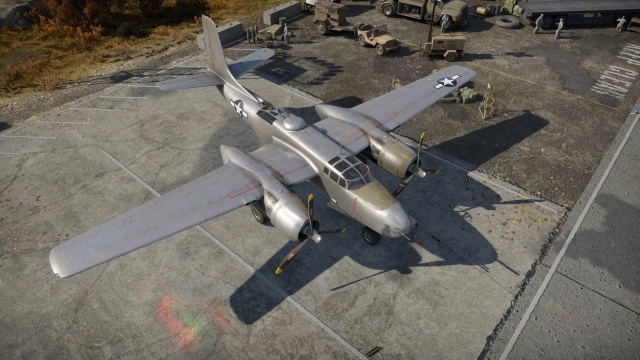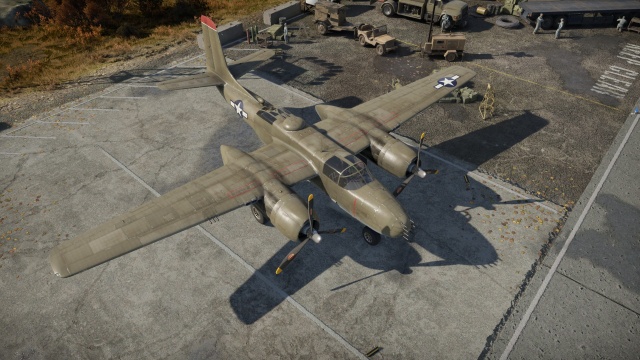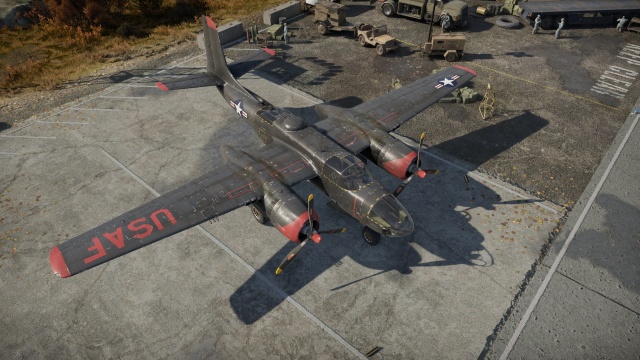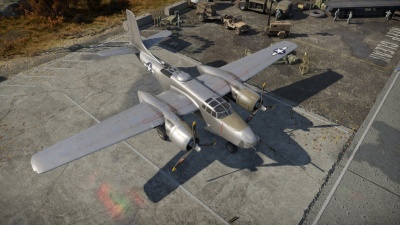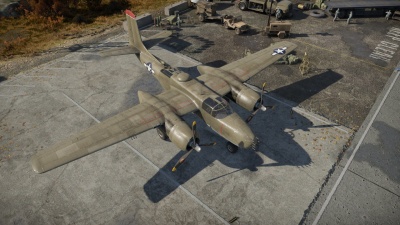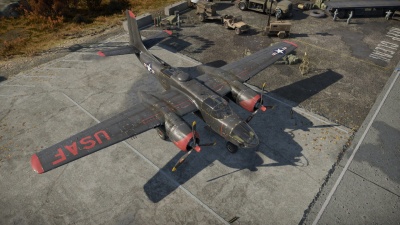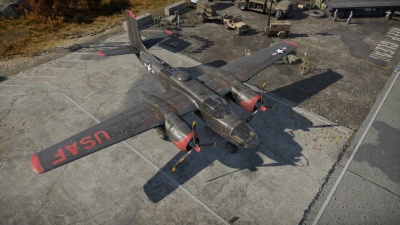Difference between revisions of "A-26 (Family)"
(Major addition, just needs some polishing. ~P51) |
(Edits) |
||
| Line 1: | Line 1: | ||
| − | |||
| − | |||
| − | |||
<gallery mode="packed-hover"> | <gallery mode="packed-hover"> | ||
| − | + | File:GarageImage_A-26B-10.jpg|''[[A-26B-10|A-26B "Invader" early model]]'' | |
| − | + | File:GarageImage_A-26B-50.jpg|''[[A-26B-50|A-26B "Invader" late model]]'' | |
| + | File:GarageImage_A-26C-45.jpg|''[[A-26C-45|A-26C "Invader" late model]]'' | ||
</gallery> | </gallery> | ||
| − | < | + | <div style="float:right">__TOC__</div> |
| + | |||
| + | ==History== | ||
| + | ===Development=== | ||
| + | The A-20 was a war winning design, but was being rapidly exceeded by the frantic place of new technologies and more capable aircraft. In every way the A-26 is an A-20 made bigger, better, badder. Still consisting of a crew of 3, this new version could carry more bombs farther and faster. It could also mount big and bigger cannons, carry the latest weapons, offer better defensive fire power with more coverage, and carry 2 torpedoes. | ||
| + | |||
| + | This sequel was clearly worthy of the original! | ||
| − | + | The A-26 retained many features of its older sibling. Take an A-20, widen the fuselage about 2x, lengthen the engine nacelles and make them more cylindrical, and square off the wing tips, elevator, and rudder, you would have an A-26. Of course under the skin was a far more sophisticated aircraft with more powerful everything to keep it competitive in a world gone mad. | |
| − | |||
| − | + | From the first production versions to the last "-55" versions there was little difference externally, an indication of how well the original design was. The most noticeable difference was from the heavily framed cockpit canopy to a slightly raised all Plexiglas canopy with a much better crew view. | |
| − | + | It was after WW2 that the frame was subject to extensive trials and experiments. During the Korean War, IR night vision was tried (ironically a system first tested on the Dornier Do 17, which was the impetus for the A-20!). | |
| − | + | When Vietnam escalated from a clash to a conflict the tired 26B and 26C's age started to show. A major overhaul program rebuilt the old Invaders into the A-26K Counter Invader (aka "Special K") that surpassed expectations in combat mission success. | |
| − | + | Others surplus B and C's became successful executive transports and utility aircraft. | |
| − | ===Manufacturer=== | + | ===Manufacturer=== |
| − | Douglas Aircraft Company was one of the great aircraft producers of the interbellum years. | + | Douglas Aircraft Company was one of the great aircraft producers of the interbellum years. It was perhaps the first name in aircraft of the time, overshadowing Boeing and Lockheed and produced some ground breaking aircraft, and the most important aircraft in all of history, the DC-3 (C-47). |
Besides the founder, Donald Douglas, employees that worked there were Edward (Ed) Heinemann, Robert Donovan, Apollo M.O. Smith, Ted R. Smith, and Jack Northrop (the last two went on to create successful companies later). | Besides the founder, Donald Douglas, employees that worked there were Edward (Ed) Heinemann, Robert Donovan, Apollo M.O. Smith, Ted R. Smith, and Jack Northrop (the last two went on to create successful companies later). | ||
| + | |||
| + | {{Template:AirManufacturer Douglas}} | ||
| + | |||
===Operators=== | ===Operators=== | ||
| − | While the A-20 eventually was flown by dozens of countries on both sides of the conflict (including Germany and Japan), the A-26 was | + | While the A-20 eventually was flown by dozens of countries on both sides of the conflict (including Germany and Japan), the A-26 was a US only aircraft until after the Korean War when the US started to sell or give it away to allies. It was quickly distributed to dozens of nations. One of the recipients was Cuba, which ironically had a revolution and in response the American government formed a secret air force to attack the now Communist Cuba, with A-26's! |
| − | ===Operations/Service History=== | + | ===Operations/Service History=== |
The first combat missions were flown by the USAAF in 1944. | The first combat missions were flown by the USAAF in 1944. | ||
The last combat mission was flown by the Honduran Air Force in 1977, 33 years later. | The last combat mission was flown by the Honduran Air Force in 1977, 33 years later. | ||
Governmental service continued for years later as "Borate Bombers" to put out wild fires. | Governmental service continued for years later as "Borate Bombers" to put out wild fires. | ||
| − | Over the decades there is almost nothing an Invader was not involved in (one even had a jet engine installed!). | + | Over the decades there is almost nothing an Invader was not involved in (one even had a jet engine installed!). Already older than some of the crew that flew her, they proved their worth over the jungles of Vietnam, earning great respect and love by those who flew the "Special K" version. |
| − | |||
| − | |||
| − | |||
| − | + | === Legacy === | |
| + | Today the Invader is one of the most iconic war planes ever. With almost 3 generations of pilots flying them, there is a rich legacy and deep love for this hot rod of an aircraft. | ||
| − | + | == The Invaders! == | |
| − | |||
| − | |||
| − | |||
| − | |||
| − | |||
| − | |||
| − | == The | ||
| − | |||
| − | |||
| − | |||
| − | |||
| − | |||
| − | |||
[[File:GarageImage_A-26B-10.jpg|400px|thumb|left]] | [[File:GarageImage_A-26B-10.jpg|400px|thumb|left]] | ||
| − | + | === [[A-26B-10]] === | |
| − | == [[A-26B- | + | {{Break}} |
| − | |||
| − | {{ | ||
[[File:GarageImage_A-26B-50.jpg|400px|thumb|left]] | [[File:GarageImage_A-26B-50.jpg|400px|thumb|left]] | ||
| + | === [[A-26B-50]] === | ||
| + | {{Break}} | ||
| − | {{ | + | [[File:GarageImage_A-26C-45.jpg|400px|thumb|left]] |
| − | + | === [[A-26C-45]] === | |
| − | + | {{Break}} | |
| − | + | [[File:GarageImage_A-26C-45DT.jpg|400px|thumb|left]] | |
| + | === [[A-26C-45DT]] === | ||
| + | {{Break}} | ||
| − | == | + | == Media == |
| − | + | {{Youtube-gallery|E1IDVFUqzrI|'''The Shooting Range #83''' - ''Pages of History'' section at 10:29 discusses the Douglas A-26 Invader.}} | |
| − | |||
| − | |||
| − | |||
[[Category:Family pages]] | [[Category:Family pages]] | ||
Revision as of 10:25, 10 November 2020
History
Development
The A-20 was a war winning design, but was being rapidly exceeded by the frantic place of new technologies and more capable aircraft. In every way the A-26 is an A-20 made bigger, better, badder. Still consisting of a crew of 3, this new version could carry more bombs farther and faster. It could also mount big and bigger cannons, carry the latest weapons, offer better defensive fire power with more coverage, and carry 2 torpedoes.
This sequel was clearly worthy of the original!
The A-26 retained many features of its older sibling. Take an A-20, widen the fuselage about 2x, lengthen the engine nacelles and make them more cylindrical, and square off the wing tips, elevator, and rudder, you would have an A-26. Of course under the skin was a far more sophisticated aircraft with more powerful everything to keep it competitive in a world gone mad.
From the first production versions to the last "-55" versions there was little difference externally, an indication of how well the original design was. The most noticeable difference was from the heavily framed cockpit canopy to a slightly raised all Plexiglas canopy with a much better crew view.
It was after WW2 that the frame was subject to extensive trials and experiments. During the Korean War, IR night vision was tried (ironically a system first tested on the Dornier Do 17, which was the impetus for the A-20!). When Vietnam escalated from a clash to a conflict the tired 26B and 26C's age started to show. A major overhaul program rebuilt the old Invaders into the A-26K Counter Invader (aka "Special K") that surpassed expectations in combat mission success.
Others surplus B and C's became successful executive transports and utility aircraft.
Manufacturer
Douglas Aircraft Company was one of the great aircraft producers of the interbellum years. It was perhaps the first name in aircraft of the time, overshadowing Boeing and Lockheed and produced some ground breaking aircraft, and the most important aircraft in all of history, the DC-3 (C-47).
Besides the founder, Donald Douglas, employees that worked there were Edward (Ed) Heinemann, Robert Donovan, Apollo M.O. Smith, Ted R. Smith, and Jack Northrop (the last two went on to create successful companies later).
| Douglas Aircraft Company | |
|---|---|
| Strike Aircraft | A-20G-25 · A-26B-10 · A-26B-50 · AD-2 · AD-4 · A-1H |
| Bombers | TBD-1 · B-18A · SBD-3 · BTD-1 · A-26C-45 · A-26C-45DT |
| Turboprops | A2D-1 |
| Jet Aircraft | F3D-1 · F4D-1 |
| A-4 Skyhawk | A-4B · A-4E Early |
| Export | ▄Havoc Mk I · ▄Boston Mk I · ▄DB-7 · ▂A-20G-30 · ▄AD-4 · ▄AD-4NA |
| A-4 Skyhawk | A-4H · A-4E Early (M) · Ayit · A-4E |
| The Douglas Aircraft Company merged with McDonnell Aircraft Corporation in 1967 to form McDonnell Douglas. | |
Operators
While the A-20 eventually was flown by dozens of countries on both sides of the conflict (including Germany and Japan), the A-26 was a US only aircraft until after the Korean War when the US started to sell or give it away to allies. It was quickly distributed to dozens of nations. One of the recipients was Cuba, which ironically had a revolution and in response the American government formed a secret air force to attack the now Communist Cuba, with A-26's!
Operations/Service History
The first combat missions were flown by the USAAF in 1944. The last combat mission was flown by the Honduran Air Force in 1977, 33 years later. Governmental service continued for years later as "Borate Bombers" to put out wild fires.
Over the decades there is almost nothing an Invader was not involved in (one even had a jet engine installed!). Already older than some of the crew that flew her, they proved their worth over the jungles of Vietnam, earning great respect and love by those who flew the "Special K" version.
Legacy
Today the Invader is one of the most iconic war planes ever. With almost 3 generations of pilots flying them, there is a rich legacy and deep love for this hot rod of an aircraft.
The Invaders!
A-26B-10
A-26B-50
A-26C-45
A-26C-45DT


